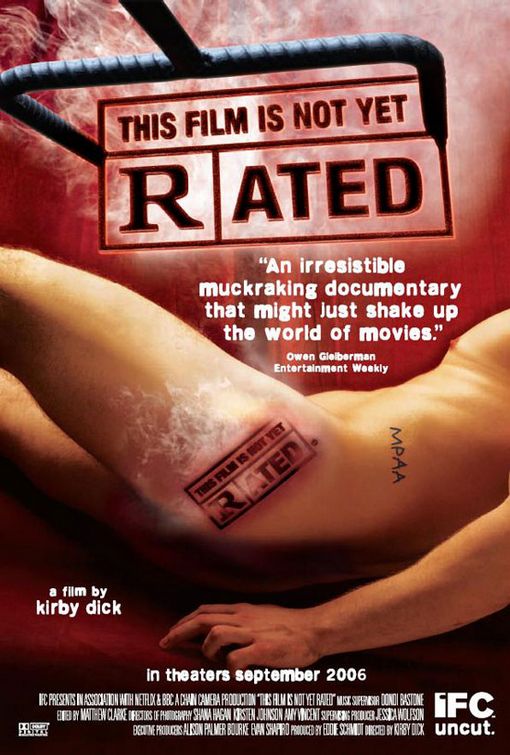
The other night I had a chance to watch the documentary This Film Is Not Yet Rated, which takes a very close and scrutinizing look at the MPAA (Motion Picture Association of America) and its rating system. Basically, the system was set up so films would no longer have to be censored, only, in a way, films are being censored as a rating such as PG-13 or R or NC-17 can make or break a movie. There are no guidelines for what ratings movies get; an anonymous group of people (supposedly average American parents) watch movies and base their decisions on nothing more than their feelings. The film examines the inconsistencies displayed by the MPAA and does some investigating to find out who these anonymous people are.
Anyway, if you're a moviegoer, it's definitely worth checking out. And, of course, it made me wonder what would happen if there was such an anonymous group who rated books. Just imagine: on the back of every book, there is some kind of rating, maybe a quick description of whether or not there is foul language, nudity (?), violence, drug use, etc. (Yes, yes, children's and YA books do sometimes have suggested reader ages on the back, or at least so did some of the books I've seen.)
Except, oftentimes, it is the publishers who do the censoring. Or rather, the editors decide what needs to be taken out of a book, what might make it too racy (though there have been occurrences where booksellers, like Wal-Mart, will refuse to carry a title based on the content and sometimes even the cover, and that forces publishers to be even more hesitant about what they publish).
Then again, what does censor even mean?
Many years ago, I sold a story to an upcoming horror magazine. The pay wasn't bad (three cents per word) and I was really happy to be in the magazine to begin with. But the editor, he wanted me to change the story up a bit. Basically, despite the fact it was a horror magazine, he wanted to keep it clean in terms of language. So there had been a few F words in my story that I changed around. No big deal. I didn't feel like I was making a big sacrifice by nixing those swear words. The editor also wanted me to change a very small part, where the main character becomes aroused. I think the original wording was something like "he felt his dick hardening" and the editor wanted me to tone that down, so we went with something like "he felt himself becoming aroused." Again, no big deal. The editor wanted to publish my story. He was paying me. If he wanted me to change around a few things, no big deal. It was his magazine, after all, and truthfully, I preferred that he worked with me on changing the story around instead of just doing it himself (which some editors are known to do).
Was I being censored? No. I was being edited. The changes didn't greatly alter the story in any way. It wasn't like he wanted me to rewrite the ending and fill it with rainbows and unicorns (though that may have been interesting, now that I think about it).
Some writers in my position may have refused. It's their story, and they want it published as is. Which, obviously, is very hard-headed thinking. At a certain point, a writer has to let go of his or her work.
Of course, there is a line between editing and censoring. And trying to point out the differences between the two could open a can of worms, so I'm not even going to try. Because my interpretation of editing and censoring would no doubt differ from many others' interpretations. Like I said, some would think the editor was trying to censor me by getting rid of those F words and changing around that one sentence. I didn't see it that way. So far I don't believe I have ever been censored (well, except one time in high school, but that's a story for another time), but when the time comes, I'm confident I'll know it.
Now I leave you with a shaky video of Matt Stone explaining how they added to the sex scene in Team America knowing that the MPAA would want them to cut stuff out. Just watch, you'll see what I mean:
httpv://www.youtube.com/watch?v=eHHHHozaAWQ